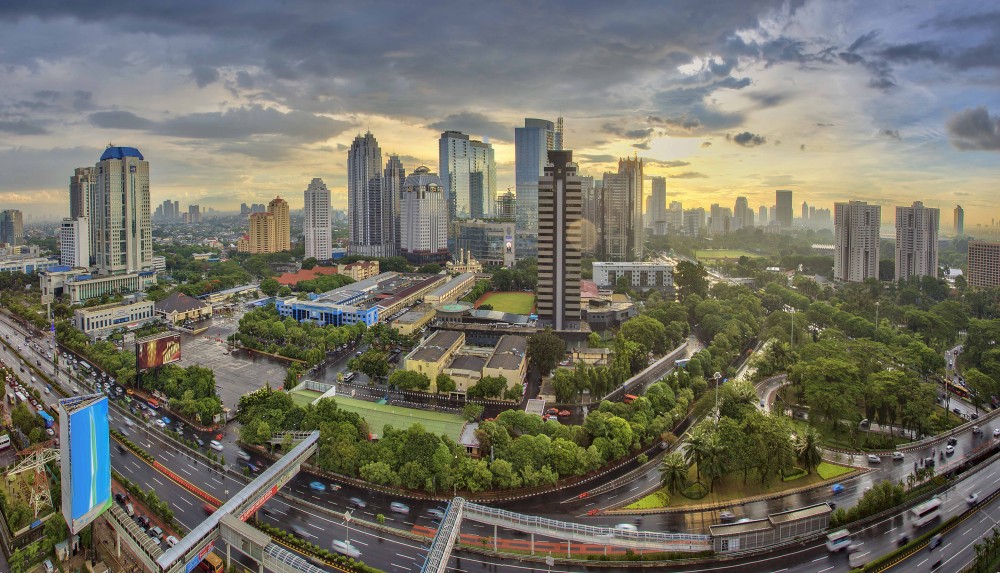Indonesia's Economic Resilience: Navigating Challenges, Embracing Opportunities
Indonesia has positioned itself as a beacon of economic resilience, driven by strategic policy initiatives, trade expansions, and investments in value-added industries. Despite global uncertainties, the country continues to demonstrate steady growth, highlighting its adaptability and potential as Southeast Asia's largest economy.
Steady Economic Growth Amid Challenges
In 2024, Indonesia's GDP growth rate remained robust at 5%, projected to rise to 5.1% in 2025. This performance underscores the effectiveness of policies addressing inflation and public debt. Headline inflation dropped to 1.71% in October 2024, thanks to targeted subsidies and price caps. Meanwhile, a manageable public debt-to-GDP ratio of 39.6% reflects prudent fiscal strategies, enabling room for critical infrastructure investments.
Indonesia's trade surplus, maintained for 53 consecutive months as of September 2024, showcases its strength in non-oil and gas exports like mineral fuels, vegetable oils, and iron and steel. However, fluctuations in global commodity prices and heavy reliance on China, its top trading partner, pose vulnerabilities. Slowing Chinese economic growth resulted in a 16.24% decline in exports to the country in early 2024, emphasizing the need for diversification.
Policy Innovations Driving Industrial Growth
Indonesia's policy focus on industrial downstreaming is transforming its economic landscape. The export bans on raw nickel and bauxite have significantly boosted manufacturing, with the country's share in global nickel production reaching 40.2% in 2023. Investments worth $30 billion, primarily from China, underscore Indonesia's growing importance in the electric vehicle (EV) and battery manufacturing ecosystem. This transition not only enhances value addition but also positions Indonesia as a global hub for sustainable industries.
The government’s ambitious Vision 2045 aims to elevate Indonesia to high-income status. By prioritizing governance reforms, economic diversification, and sustainable development, this roadmap sets a clear trajectory for long-term growth.
Key Sectors Undergoing Transformation
1. Manufacturing and Services:
Manufacturing remains the backbone of Indonesia’s economy, contributing significantly to GDP. The services sector, including retail, construction, and digital economy segments, continues to grow, supported by infrastructure development and domestic consumption.
2. Micro, Small, and Medium Enterprises (MSMEs):
Representing 99% of business units and employing 97% of the workforce, MSMEs are vital to Indonesia's economy. However, challenges like limited access to finance and stringent lending criteria hinder their full potential. Addressing these issues is critical to enhancing MSME contributions to global trade.
3. Infrastructure Development:
Massive investments in roads, ports, and digital infrastructure aim to reduce logistical costs and open new markets. The relocation of the capital to Nusantara in East Kalimantan is another significant project addressing overpopulation and environmental concerns in Jakarta.
Challenges and Opportunities
While Indonesia’s economy shows remarkable resilience, challenges such as regulatory barriers, environmental sustainability, and over-reliance on commodities persist. The logistics sector, for instance, faces inefficiencies, with costs accounting for 21–23% of GDP. Initiatives like the "Tol Laut" program aim to improve connectivity but struggle with infrastructural support in remote areas.
Moreover, achieving the 2060 net-zero emissions target requires scaling up renewable energy investments and enforcing sustainable practices across industries. Progress in the EV ecosystem and biofuel mandates demonstrates potential, but reliance on coal-fired power plants highlights the complexity of Indonesia’s energy transition.
A Vision for the Future
Indonesia's economic resilience is rooted in its strategic vision and robust policies. By balancing domestic priorities with global economic dynamics, the country can navigate challenges and seize emerging opportunities. Investments in human capital, sustainable infrastructure, and industrial diversification are essential to realizing its Vision 2045. As Indonesia transitions into a global economic powerhouse, it serves as a model for resilience and innovation in the face of uncertainty.
This article draws insights from the "Rubix Country Insights: Indonesia, December 2024," published by Rubix Data Sciences.
Read More






 Wednesday, 25-02-26
Wednesday, 25-02-26







